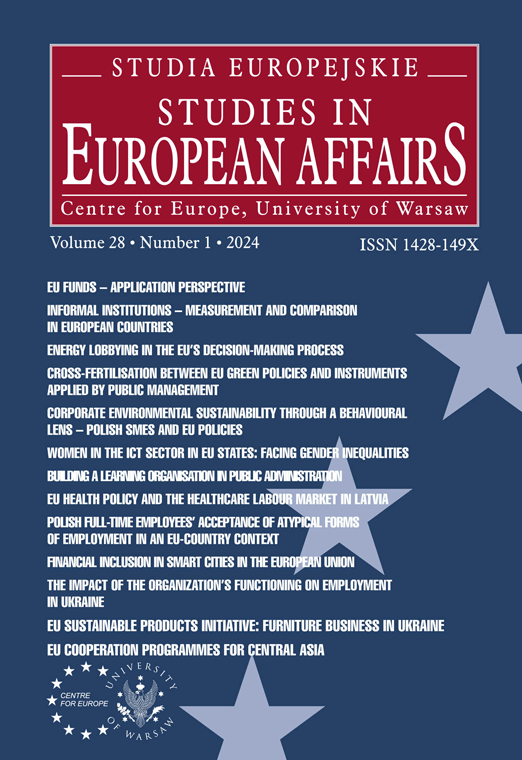
ISSUE: 1/2024
- Volume 28
- Number 1
- 2024
Subscribe NEWSLETTER
Studia Europejskie –
Studies in European Affairs
ISSN: 1428-149X
e-ISSN: 2719-3780
License
Articles published in the journal are under a Creative Commons Attribution – Non Commercial – No Derivatives 4.0 International License
The EU’s Sustainable Product Initiative: Enhancing the Readiness of the Furniture Business in Ukraine
Abstract
This study has been inspired by a set of new rules which are expected to be implemented within the EU’s Ecodesign for Sustainable Products Regulation (ESPR). Considering the possible market risks for the Ukrainian furniture industry, and that includes both exporters and non-exporters (within the context of the harmonisation of the rules), this research sought to capture and understand the readiness of companies as regards the changes on the EU market, along with those companies’ sentiments and ability to cope with the upcoming inherent challenges. The survey of furniture producers presented in this paper is one of the first devoted to the problem of Ukrainian producers’ adaptability to the ESPR, made all the more challenging due to the burden of the ongoing war. This study has brought to light rather positive industry sentiments regarding furniture production volume and the competitive position of companies within the furniture industry, but there is also a lack of company awareness of the full range of ESPR measures and tools, hence there is a risk of underestimating those measures and tools’ possible impact along with the risk of a delayed response. Environmental sustainability values should be given higher priority than they are currently in companies’ current marketing strategies, and the effectiveness of supply chain management practices will inevitably have to be questioned by company leaders. Possible adaptation measures aimed at circularity are not sufficiently perceived, while attention is focused more on the use of materials, energy, and environmental pollution.
References
Bock, T. and Sergeant, J. (2002) “Small Sample Market Research”, International Journal of Market Research. Vol. 44/2, pp. 1–7. DOI: 10.1177/147078530204400205 (Access 1.01.2024).
Chowdhury, M.H., Rahman, S., Quaddus, M.A. and Shi, Y. (2023) “Strategies to mitigate barriers to supply chain sustainability: an apparel manufacturing case study”, Journal of Business & Industrial Marketing. Vol. 38/4, pp. 869–885. DOI: 10.1108/JBIM-04-2021-0233.
EFIC (2022) European Furniture Industries Confederation position on the Commission proposal for an Ecodesign for Sustainable Products Regulation. Available at: https://www.efic.eu/efic-position-proposal-regulation-ecodesign-sustainable-products (Access 14.10.2023).
European Commission (2013) Communication from the Commission to the European Parliament and the Council. Building the Single Market for Green Products. Facilitating better information on the environmental performance of products and organisations. Available at: https://eur-lex.europa.eu/legal-content/EN/TXT/?uri=celex:52013DC0196 (Access 14.10.2023).
European Commission (2020) Communication from The Commission to The European Parliament, The Council, The European Economic and Social Committee and The Committee of The Regions. A new Circular Economy Action Plan For a cleaner and more competitive Europe. COM/2020/98 final. Available at: https://eur-lex.europa.eu/legal-content/EN/TXT/?uri=COM:2020:98:FIN (Access 14.10.2023).
European Commission (2022a) Communication from the Commission to the European Parliament, the Council, The European Economic and Social Committee and The Committee of the Regions. On making sustainable products the norm. COM/2022/140 final. Available at: https://eur-lex.europa.eu/legal-content/EN/TXT/?uri=CELEX:52022DC0140 (Access 14.10.2023).
European Commission (2022b) Proposal for a Regulation of the European Parliament and of the Council establishing a framework for setting ecodesign requirements for sustainable products and repealing Directive 2009/125/EC. COM(2022) 142. Available at: https://eur-lex.europa.eu/legal-content/EN/TXT/?uri=CELEX:52022PC0142 (Access 14.10.2023).
European Commission (2023) The Joint Harmonised EU Programme of Business and Consumer Surveys: User Guide. Updated January 2023. Available at: https://economy-finance.ec.europa.eu/system/files/2023-02/bcs_user_guide.pdf (Access 14.10.2023).
European Parliament (2023) Amendments adopted by the European Parliament on 12 July 2023 on the proposal for a regulation of the European Parliament and of the Council establishing a framework for setting eco-design requirements for sustainable products and repealing Directive 2009/125/EC (COM(2022) 0142 – C9-0132/2022 – 2022/0095(COD)). Available at: https://www.europarl.europa.eu/doceo/document/TA-9-2023-0272_EN.html (Access 14.10.2023).
Heinemann, C. and Arsenio, F. (2022) New EU eco-design proposals: Case studies to illustrate their potential impact. Final Report. November. European Environmental Bureau (EEB). Available at: https://eeb.org/wp-content/uploads/2022/12/Impact-of-EU-ecodesign-regs.pdf (Access 14.10.2023).
Interfax-Ukraine (2023) Ukrainski vyrobnyky mebliv eksportuvaly produkcii na $806,6 mln za 2022 rik – UAM (Українські виробники меблів експортували продукції на $806,6 млн за 2022 рік – УАМ). 25 January. Available at: https://interfax.com.ua/news/economic/886805.html (Access 14.10.2023).
Kaldor, G. (2023) “Ecodesign for sustainable products: What will change for consumers and businesses?”, Renewable Matter. 13 January. Available at: https://www.renewablematter.eu/articles/article/ecodesign-for-sustainable-products-what-will-change-for-consumers-and-businesses (Access 14.10.2023).
Khattak, A. (2022) “Are environmental sustainability thoughts a panacea for environmental performance? Social innovation and moderating role of green innovation”, International Journal of Innovation Science. DOI: 10.1108/IJIS-10-2022-0190.
Nand, A.A., Menon, R., Bhattacharya, A. and Bhamra, R. (2023) “A review of sustainability trade-offs affecting suppliers in developed and less developed countries”, Journal of Business & Industrial Marketing. Vol. 38/3, pp. 463–483. DOI: 10.1108/JBIM-04-2021-0213.
Official Journal (2014) Association Agreement between the European Union and its Member States, of the one part, and Ukraine, of the other part. Official Journal of the European Union L 161/3, 29 May. Available at: https://publications.europa.eu/resource/cellar/4589a50c-e6e3-11e3-8cd4-01aa75ed71a1.0006.03/DOC_1 (Access 14.10.2023).
Šajn, N. (2022) Ecodesign for sustainable products [EU Legislation in Progress].
European Parliamentary Research Service. 9 June. Available at: https://epthinktank.eu/2022/06/09/ecodesign-for-sustainable-products-eu-legislation-in-progress/ (Access 14.10.2023).
Ukrainian Association of Furniture Manufacturers (2023) UAFM in the faces: How to preserve and even develop business amidst wartime challenges. This is the reflection of Vyacheslav Kovalchuk, the owner of the “Lacover” company. 22 August. Available at: https://uafm.com.ua/uam-v-oblychchyah-yak-zberegty-j-navit-rozvynuty-biznes-v-umovah-voyennogo-stanu-pro-tse-rozmirkovuye-vlasnyk-kompaniyi-lakover-vyacheslav-kovalchuk/?fbclid=IwAR09Osyfr4HhLLIleiGNpGQUZ-Y05GuNf5YLiRvLMAXezxE96xJiV4sqn-4 (Access 14.10.2023).
Vaccaro, V.L. (2009) “B2B green marketing and innovation theory for competitive advantage”, Journal of Systems and Information Technology. Vol. 11, No. 4, pp. 315–330. DOI: 10.1108/13287260911002477.
Veerabhadrappa, N.B.B., Fernandes, S. and Panda, R. (2023) “A review of green purchase with reference to individual consumers and organizational consumers: A TCCM approach”, Cleaner and Responsible Consumption. Vol. 8, 100097. DOI: 10.1016/j.clrc.2022.100097 (Access 14.10.2023).
Language: English
Pages: 225-246
How to Cite:
Harvard
Vrublevska, O. (2024) "The EU’s Sustainable Product Initiative: Enhancing the Readiness of the Furniture Business in Ukraine". Studia Europejskie – Studies in European Affairs, 1/2024, pp. 225-246. DOI: 10.33067/SE.1.2024.12